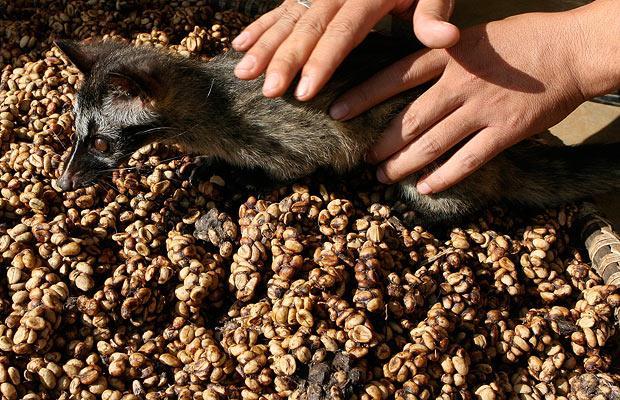
VIETNAM | Ca Phe Cut Chon: Cat Dung in a Cup

Weasel coffee, or cà phê chồn for the local Vietnamese, is a unique type of coffee which unlike other types of coffee, are produced in quite an interesting way. This strong, rich-tasting brew is actually made from undigested coffee beans picked from civet cat stool.
Many people may frown on the idea of drinking a cup made from cat dung, but surprisingly, many who have tried it admits that this cup of joe is indeed pleasant and often addictive.
The process of producing Ca Phe Cut Chon is done by washing, sundrying, roasting and then grinding the salvaged beans. Civet cats are believed to be coffee connoisseurs and only eat the best and fleshiest beans. The civet's digestive enzymes ferment and break down the proteins from the beans, resulting to beans that makes rich, smooth coffee that is slightly smoky and with some hint of chocolate. Compared to the typical coffee, the Ca Phe Cut Chon is also more aromatic and less bitter.
Though Vietnam is a large producer of coffee in the world, second-largest to be exact, it is somehow undiscovered and under-recognized. Coffee beans exported from Vietnam are commonly used in cheap instant Western coffee. Because of such, some Vietnamese coffee producers admits the need to introduce a trendy style of coffee drinking, somehow like how Starbucks is marketing their beverage. And they believe that marketing the “Civet dung coffee” is the perfect way to do that. Being natural, they believe how it can make real and great-tasting coffee.
In the twentieth century, civet coffee became an increasingly popular bourgeois experience, due to the novelty and prestige associated with its purchase and consumption; the coffee then became among the most expensive in the world. Because of its price tag, one huge challenge nowadays is the growing production of fake civet beans now widely peddled at outdoor markets. Made with artificial fragrances that bear little resemblance to the beverage's unique taste, they are also priced so much less than the real thing. Thus, despite the obvious difference, many people are patronizing the knock-off. Some larger coffee producers even determined a more sophisticated process to come close to the authentic taste and aroma of the civet coffee.
Even the production of the authentic civet cat coffee has evolved into a process that is frowned upon by many. At present, many coffee producers use captive civets, but the process remains the same. Instead of collecting cat manure in the wild, most chon merchants now rent out farms where the cats can roam. This allows the farmers to easily gather the droppings, wash them, then dry out in the sun. Each producer has their own unique method of then roasting the beans to preserve its natural taste.
Heavy criticisms are being put forth on the ethical aspect, or the lack of it, regarding how civet cats are treated by the farm owners. Many argue that the increased demand motivated more local farmers to produce cà phê chồn at a larger scale, perpetuating the farming of civets at the expense of their welfare. They are convinced that the conditions they were being placed under are inhumane as the civets placed in battery cages are said to be force fed with the coffee beans.
Such criticism doesn't deter the present-day civet cat coffee producers and assert their methods are in no way unethical, adding that the benefits of a strong cup of chon coffee outweigh the unsavoury aspects of it passing through an animal's bowels. Looking at the goal of changing the perception of Vietnam as a high-volume coffee producer to high-quality, they are bent on further improving and marketing Chon coffee to the coffee connoisseurs around the world.
Link nội dung: https://cdsphagiang.edu.vn/index.php/ca-phe-chon-a70367.html